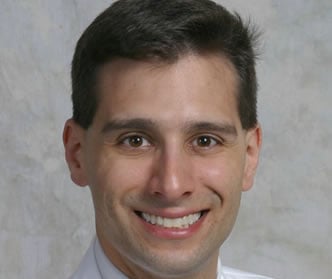Last Updated on June 27, 2022 by Laura Turner

Ryan David Madanick, MD, is fellowship program director and assistant professor of medicine at the University of North Carolina School of Medicine, Division of Gastroenterology and Hepatology. Madanick earned his bachelor’s degree in biology from the University of Miami (1995), and his MD from the University of Miami School of Medicine (1998). He completed both an internship (98-99) and residency (99-01) with Thomas Jefferson University, Department of Medicine. Dr. Madanick completed his fellowship at the University of Miami/Jackson Memorial Hospital, Department of Medicine, Division of Gastroenterology (01-04). He is currently in the Masters of Science in Clinical Research program at the University of North Carolina School of Public Health.
Prior to his current position, Dr. Madanick was an assistant professor of clinical medicine at the University of Miami Miller School of Medicine, Dept. of Medicine, Division of Gastroenterology. He has been published in numerous scientific journals, including the American Journal of Gastroenterology, Gastroenterology, Cleveland Clinic Journal of Medicine, Gastrointestinal Endoscopy, New England Journal of Medicine, and Digestive Diseases and Sciences. He is a member of the American Gastroenterological Assoc., the American College of Gastroenterology, the American Society for Gastrointestinal Endoscopy, the American Neurogastroenterology and Motility Society, the American Medical Association, the American College of Physicians-American Society of Internal Medicine, the North Carolina Society of Gastroenterology, and Bockus International Society of Gastroenterology. He also consults with ProVation Medical and BestDoctors.com.
When did you first decide to become a doctor? Why?
I thought I was going to be a doctor even in elementary school. In my 6th grade yearbook, I thought I’d become a pediatrician. It’s hard to say why I started considering medicine as a career since it had been in my psyche for so long.
How/why did you choose the medical school you attended?
I went through a combined program (BS/MD) at the University of Miami, so my choice was completed during high school. I had applied to a few combined programs and had been accepted to two programs. I chose the Honors Program in Medicine at UM for several reasons. The “guaranteed” acceptance to medical school was a plus, but this feature alone was not sufficient. (Acceptance wasn’t truly guaranteed; students had to maintain a certain GPA and take certain classes to continue eligibility.) I also received a full scholarship for my undergraduate years, which allowed me to pursue more liberal coursework during those years, even spending a semester abroad. At the time, UM was known as an innovative school for clinical training during medical school, so I knew that I would get excellent education.
What surprised you the most about your medical school studies?
The duration of post-medical school training surprised me the most. I entered medical school believing that I was going to be a heart surgeon, but I had no idea at the time how long the path to become a heart surgeon was, even after medical school.
Why did you decide to specialize in gastroenterology?
My first exposure to gastroenterology came during my third year of medical school while I was rotating at the VA Hospital in Miami on the internal medicine ward service. My attending physician was a gastroenterologist, and I quickly identified with his personality and style of teaching. To this day, we are still in touch and I still consider him my first mentor. However, a single personality was not enough to guide my decision. I wanted to be in a specialty that would have significant exposure to medical students in the first few years because of my knack for teaching. I was also interested in a field that provided me the opportunity for procedures. Gastroenterology satisfies all of my interests because I am able to do procedures, teach, and take care of patients on a long-term basis.
If you had it to do all over again, would you still become a gastroenterologist? (Why or why not? What would you have done instead?)
Absolutely. Even now I think about what my career would be like if I were in another field, and I can’t think of another area of specialty that gives me more enjoyment than what I currently do.
Has being a gastroenterologist met your expectations? Why?
Being a gastroenterologist has certainly met my expectations. If I think back to what my expectations were at the time I chose the field (take care of patients long-term, do procedures, teach), I have been able to do all of that.
What do you like most about being a gastroenterologist?
I most like feeling that I am making a difference in someone’s health. Whether I am dilating a patient’s esophagus because of a narrowing, removing a colon polyp that could have become cancer, or tailoring a plan of care for a patient, the thrill of doing something good for my patients drives my enjoyment.
What do you like least about being a gastroenterologist?
My least favorite question in the office is: What can/should I eat or not eat? Unfortunately most GI illness are not food related, as many websites would have you believe, at least that we understand as of now. Because the problems in gastroenterology are so closely linked in patients’ minds to foods, it can be challenging to explain to some patients that eating or avoiding one specific food is often not the answer.
What was it like finding a job in your chosen career field? What were your options and why did you decide what you did?
I came into gastroenterology during a time that I had my choice of employment. Still today, gastroenterologists are in high-demand. At the time I finished training, I could have gone into private practice virtually anywhere I wanted to live. However from the time I was in medical school, I knew that my heart was in academic medicine. This decision limited the options a bit more, primarily because of my geographic restrictions. Ultimately I decided to stay at the institution where I trained in gastroenterology (again, University of Miami), principally because I was comfortable there. I have since moved to UNC because of an excellent career opportunity.
Describe a typical day at work.
As an academic gastroenterologist, it’s easier to explain a typical week than a typical day, since my weekdays are all quite different. On Mondays, I see patients in a specialty clinic for esophageal disorders. Tuesdays and Thursdays are my “academic days.” I spend most of these days in my academic office, writing, preparing talks, doing research or administration, or taking care of other tasks that come up. On Wednesdays, I perform endoscopy all day. On Fridays I either do endoscopy all day or spend the day interpreting the esophageal tests that have been performed in our Motility Lab. I also attend teaching and research conferences for our division several times a week.
On average: How many hours a week do you work? How many hours do you sleep per night? How many weeks of vacation do you take?
The answer really depends on what you consider work. I tend to spend about 50 to 55 hours a week in my academic office, endoscopy units, and clinic. However I do a lot of non-patient care work at home after the kids are sleeping and on the weekends. It adds up to about 65 to 70 hours a week overall. Unfortunately, I don’t get as much sleep as I should because I tend to get into my work groove at night. I average about five and a half to six hours of sleep per night during the week, a bit more on the weekends. I take four weeks of vacation a year.
Are you satisfied with your income? Explain.
Relatively satisfied, but I made a conscious choice to stay in academic medicine, which pays notably less than private practice. If money had been my only goal, I would have taken a different route. However, there are plenty of aspects of my career that give me satisfaction enough to make up for a lower income than I could potentially have. I made a decision based on my values to sacrifice certain financial gains for other considerations that keep me more satisfied. My income affords me enough to pay my bills and still have enough left over for recreation. Not that I wouldn’t be happier with a larger income, but a successful career as an academic gastroenterologist is more important to me than the financial bottom line.
If you took out educational loans, is/was paying them back a financial strain? Explain.
With my current income, paying back my loans is not a huge problem. I factor my loan payments into our budget and have them automatically debited from my bank account on a monthly basis.
In your position now, knowing what you do – what would you say to yourself when you started your medical career?
Find a mentor. Not just an advisor, a mentor. Find someone who will put the time in altruistically to guide you through the decisions you’ll need to make that will affect the rest of your life.
What information/advice do you wish you had known when you were beginning medical school?
Learn how to do research. This doesn’t just mean hooking up with someone who is already working on research. To advance in academic medicine, you have to learn how to design research well, so taking an extra year or two to get the experience you need will serve you well for the next 30 years.
From your perspective, what is the biggest problem in health care today?
Health care costs, especially for patients with chronic conditions. I don’t think health care should be free, but it shouldn’t be as expensive as it is right now.
Where do you see gastroenterology in 10 years?
In the next decade, I think we’ll see significant advances in the therapy for inflammatory bowel disease and viral hepatitis. I also am hopeful we’ll have better therapy for painful conditions like irritable bowel syndrome. Endoscopy will continue its shift from being primarily a diagnostic tool to a more therapeutic skill and start to merge more with surgery than ever before.
What types of outreach/volunteer work do you do, if any?
I do not currently do volunteer work per se, although I do a lot of blogging and microblogging (on Twitter), if you consider that educational outreach.
Do you have family? If so, do you have enough time to spend with them? How do you balance work and life outside of work?
I have a wife and two children. I try to spend enough time with them, especially on the weekends, but work is often on my mind. This is an unfortunate personality trait that I’ve been actively working on changing by developing skills to better organize my work life and home life. On my most recent vacation, I completed disconnected from the digital world (no email, no internet access) for several days. It was the first time I did so, and I’ll definitely be doing it at least once or twice a year from now on.
Do you have any final piece of advice for students interested in pursuing gastroenterology as a career?
If you are interested in gastroenterology, find a current gastroenterologist to shadow, work with, or do research with. But also explore other specialties. Make sure it is the right choice for you before committing to it for good. I’d recommend the same thing for any specialty. Most students change their minds from the time they enter medical school until they enter practice for the first time, so be open to all of your options.

thanks for the post…enjoyed your to the point responses.
What a great read! I thoroughly enjoyed this 🙂